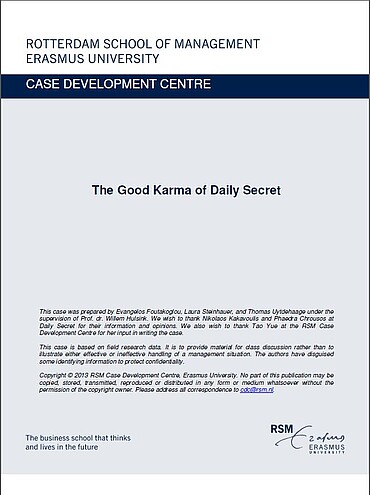Citation Note
Based on Field research; 16 pages.
Follow the 'handle' link to access the Case Study on RePub.
For EUR staff members: the Teaching Note is available on request, you can contact us at rsm.nl/cdc/contact/
For external users: follow the link to purchase the Case Study and the Teaching Note.
Objective
The Daily Secret case has four main focal points. The first one involves the way in which the background of the entrepreneur affects the structure and operations of the company, specifically looking at the educational background, cultural background, personal network. The second one discusses how environmental forces create opportunities and/or obstacles for entrepreneurial activities, specifically analyzing the regulatory environment, economic environment, cultural environment. The third one aims at increasing students’ understanding of how the internet can serve as a catalyst facilitating entrepreneurial activity and the fourth one emphasizes the trade-offs entrepreneurs face while searching for funding from external sources.
description
After two months’ financially draining and disappointing search for investors in New York, the founders of the Greek startup, Daily Secret, had to decide whether to go back home to resume slow and steady growth, or accept a VC’s offer and adjust their vision to meet market demands.
Abstract
This case focuses on the attempt of Daily Secret’s founders to keep control of their initial good-karma vision while seeking external funding to accelerate business expansion. The case addresses factors that are typically important for the growth of today’s born globals, including trust among employees, the use of the Internet, and network and relationship building. It also looks closely at how economic circumstances and culture influence the birth and operations of an entrepreneurial organization. The case concentrates on Daily Secret’s two founders, Nikos Kakavoulis and Phaedra Chrousos, and the two strategic options they faced - going back home to resume slow and steady growth without any external investments while maintaining full ownership (but with great uncertainty) over business sustainability, or accepting the financially attractive offer made by one VC and having to keep the balance between their good karma vision and market demands.
usage
This case is suitable for advanced Bachelor courses or Master/MBA courses. Prior knowledge in basic management/business schemes is preferable. It can be used in Entrepreneurship, Marketing, Organization and Management courses.
